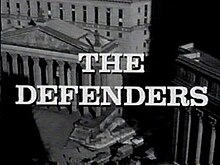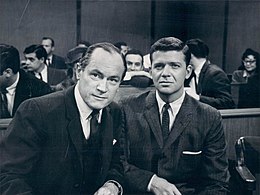The year 1968 in television involved some significant events. Below is a list of television-related events in 1968.
The year 1962 involved some significant events in television. Below is a list of notable events of that year.
The year 1960 in television involved some significant events. Below is a list of television-related events during 1960.
Peter Hess Stone was an American screenwriter and playwright. Stone is perhaps best remembered by the general public for the screenplays he wrote or co-wrote in the mid-1960s, Charade (1963), Father Goose (1964), and Mirage (1965).

Richard Jaeckel was an American actor of film and television. Jaeckel became a well-known character actor in his career, which spanned six decades. He received an Academy Award nomination for Best Supporting Actor with his role in the 1971 adaptation of Ken Kesey's Sometimes a Great Notion.
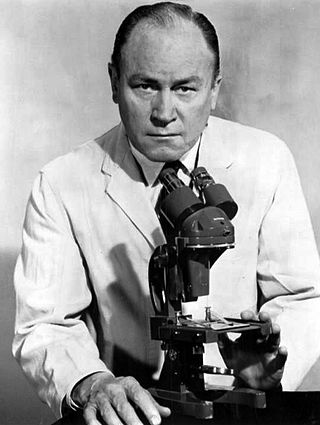
E. G. Marshall was an American actor. One of the first group selected for the new Actors Studio, by 1948 Marshall had performed in major plays on Broadway.

Joan Ann Hackett was an American actress of film, stage, and television. She starred in the 1968 western Will Penny. She was nominated for an Academy Award for Best Supporting Actress and won the Golden Globe Award for Best Supporting Actress for the 1981 film Only When I Laugh. She also starred as Christine Mannon in the 1978 PBS miniseries version of Mourning Becomes Electra.

Route 66 is an American adventure crime drama television series that premiered on CBS on October 7, 1960, and ran until March 20, 1964, for a total of 116 episodes. The series was created by Herbert B. Leonard and Stirling Silliphant, who were also responsible for the ABC drama Naked City, from which Route 66 was an indirect spin-off. Both series employed a format with elements of both traditional drama and anthology drama, but the difference was where the shows were set: Naked City was set in New York City, while Route 66 had its setting change from week to week, with each episode being shot on location.
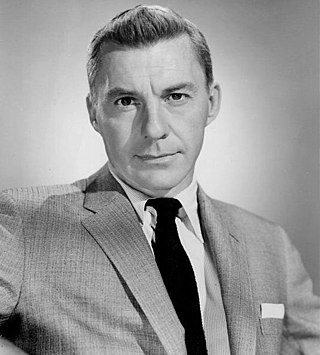
David Wayne was an American stage and screen actor with a career spanning over 50 years.
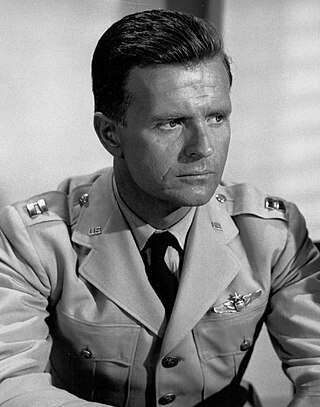
Philip Abbott was an American character actor. He appeared in several films and numerous television series, including a lead role as Arthur Ward in the crime series The F.B.I. Abbott was also the founder of Theatre West in Los Angeles.

Carl Lawrence Betz was an American stage, film, and television actor. He appeared in a variety of television series, including the CBS soap opera Love of Life; he is best remembered for playing Donna Reed's television husband, Dr. Alex Stone, from 1958 to 1966 in the ABC sitcom The Donna Reed Show. Then between 1967 and 1969, Betz played defense attorney Clinton Judd in ABC's courtroom drama Judd, for the Defense, winning an Emmy Award in 1969 for his work on that series.

East Side/West Side is an American drama series starring George C. Scott, Elizabeth Wilson, Cicely Tyson, and, later on, Linden Chiles. The series aired for one season (1963–1964), and was shown Monday nights on CBS.
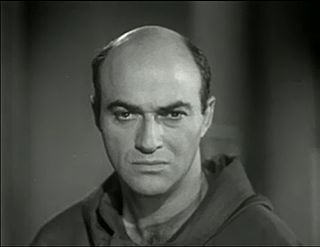
Lawrence Dobkin was an American television director, character actor and screenwriter whose career spanned seven decades.

Naked City is an American police procedural television series from Screen Gems that aired on ABC from 1958 to 1963. It was inspired by the 1948 motion picture The Naked City and mimics its dramatic "semi-documentary" format. As in the film, each episode concluded with a narrator intoning the iconic line: "There are eight million stories in the naked city. This has been one of them."

Andrew Duggan was an American character actor. His work includes 185 screen credits between 1949 and 1987 for roles in both film and television, as well a number more on stage.

Robert Reed was an American actor. He played Kenneth Preston on the legal drama The Defenders from 1961 to 1965 alongside E. G. Marshall, and is best known for his role as patriarch Mike Brady, opposite Florence Henderson's role as Carol Brady, on the ABC sitcom The Brady Bunch, which aired from 1969 to 1974. He later reprised his role of Mike Brady on several of the reunion programs. In 1976, he earned two Primetime Emmy Award nominations for his guest-starring role in a two-part episode of Medical Center and for his work on the miniseries Rich Man, Poor Man. The following year, Reed earned a third Emmy nomination for his role in the miniseries Roots.
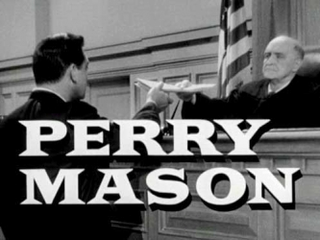
Perry Mason is an American legal drama series originally broadcast on CBS television from September 21, 1957, to May 22, 1966. The title character, portrayed by Raymond Burr, is a Los Angeles criminal defense lawyer who originally appeared in detective fiction by Erle Stanley Gardner. Many episodes are based on stories written by Gardner.

Patricia Rose Breslin was an American actress and philanthropist. She had a prominent career in television, which included recurring roles as Amanda Miller on The People's Choice (1955–58), and as Laura Harrington Brooks on Peyton Place (1964–65). She also appeared in Go, Man, Go! (1954), and the William Castle horror films Homicidal (1961) and I Saw What You Did (1965).
Armondo Linus Acosta, also known as Armand Acosta and Armando Acosta, is an American-born award-winning film director, screenwriter, cinematographer, producer and designer. He is best known for his motion picture film-in-concert Romeo.Juliet. Acosta is about to release "The Living Tableau", a stand-alone filmic recreation of Leonardo DaVinci's The Last Supper, as well as the opening sequence of Acosta's new feature film project: The Last Supper: A Divine Prophecy. "The Living Tableau" is the first time in motion picture history that Vittorio Storaro, cinematographer, Dante Ferretti, production designer and Francesca Lo Schiavo, set decorator, have worked together.

"The Defender" is an American television play broadcast live in two parts on February 25, 1957, and March 4, 1957, as part of the CBS television series, Studio One. A courtroom drama, it was written by Reginald Rose and directed by Robert Mulligan. The cast included Ralph Bellamy and William Shatner as a father-son defense team, Steve McQueen as the defendant, and Martin Balsam as the prosecutor. Rose later spun off the concept into a full series entitled The Defenders, starring E.G. Marshall and Robert Reed in Bellamy and Shatner's roles.
